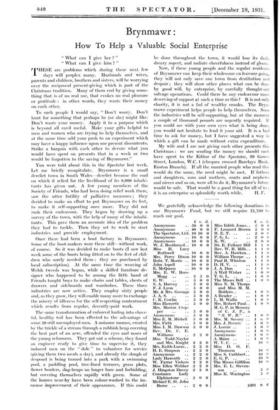Brynmawr:
How To Help a Valuable Social Enterprise "What can I give her ? " "What can I give him ? " THESE are problems which during these next few days will perplex many. Husbands and wives, parents and children, brothers and sisters, will be worrying over the reciprocal present-giving which is part of the Christmas tradition. Many of them end by giving some- thing that is of no real use, that evokes no real pleasure or gratitude : in other words, they waste their money on each other.
To such people I would say, "Don't worry. Don't hunt for something that perhaps he (or she) might like. Don't waste your money. Apply it to a purpose which is beyond all cavil useful. Make your gifts helpful to men and women who are trying to help themselves, and at the same time add your push to an experiment which may have a happy influence upon our present discontents. Strike a bargain with each other to devote what you would have spent on presents that in a week or two would be forgotten to the saving of Brynmawr."
You were told about this in the Spectator last week. Let me briefly recapitulate. Brynmawr is a small derelict town in South Wales—derelict because the coal on which it relied for the livelihood of its 8,000 inhabi- tants has given out. A few young members of the Society of Friends, who had been doing relief work there, saw the utter futility of palliative measures ; they decided to make an effort to put Brynmawr on its feet, to make it self-supporting once more. They did not rush their endeavour. They began by drawing up a survey of the town, with the help of many of the inhabi- tants. This gave them an accurate idea of the problem they had to tackle. Then they set to work to start industries and provide employment.
Once there had been a boot factory in Brynmawr. Some of the boot-makers were there still—without work, of course. So it was decided to make boots (I saw last week some of the boots being fitted on to the feet of chil- dren who sorely needed them : they are purchased by local subscription). At the same time the weaving of Welsh tweeds was begun, while a skilled furniture de- signer who happened to be among the little band of Friends taught boys to make chairs and tables, chests of drawers and sideboards and wardrobes. These three industries are now active. They employ sixty people and, as they grow, they will enable many more to exchange the misery of idleness for the self-respecting contentment which results from regular, decently-paid work.
The same transformation of enforced loafing into cheer- ful, healthy toil has been effected to the advantage of some 50 still unemployed men. A noisome morass, created by the trickle of a stream through a rubbish heap covering the best part of an acre, offended the eyes and noses of the young reformers. They got out a scheme, they found an engineer ready to give time to supervise it, they induced men on the "dole " to volunteer for service (giving them two meals a day), and already the slough of despond is being turned into a park with a swimming pool, a paddling pool, tree-lined terraces, grass plots, flower borders, slag-heaps no longer bare and forbidding, but covering themselves rapidly with green. Some of the houses near-by have been colour-washed to the im- mense- improvement, of their appearance. If this could be done throughout the town, it would lose its dark, dreary aspect, and radiate cheerfulness instead of gloom.
Now, if these young people and the regular residents of Brynmawr can keep their wholesome enicavour going, they will not only save one town from destitution and despair ; they will show other places what can be done by good will, by enterprise, by carefully thought-out salvage operations. Could there be any endeavour more deserving of support at such a time as this? It is not only charity, it is not a fad of wealthy cranks. The Bryn- mawr experiment helps people to help themselves. Soon the industries will be self-supporting, but at the moment a couple of thousand pounds are urgently required. If you could see with your own eyes what is being done, you would not hesitate to lend it your aid. It is a bad time to ask for money, but I have suggested a way in which a gift can be made without extra expenditure.
My wife and I are not giving each other presents this Christmas : we are sending the money we should each have spent to the Editor of the Spectator, 99 Gower Street, London, W.C. 1 (cheques crossed Barclays Bank, Euston Branch). If all the married people who read this would do the same, the need might be met. If fathers and daughters, sons and mothers, aunts and nephews and nieces and so on, were all to do it, Brynmawr's future would be safe. That would be a good thing for all of us ; it is an enterprise so splendidly worth While. II. F.


































 Previous page
Previous page